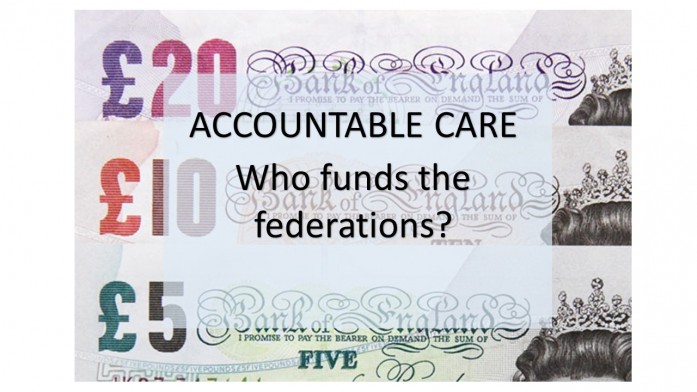You will need to bear with me this week as I try and explain why the funding of GP federations is a critical issue for emerging accountable care systems, because moving to a new non-legislated system is (unsurprisingly) complicated.
Let’s start at the beginning. The principle behind accountable care is one of providers working in partnership with each other to redesign services to improve outcomes. By the way, if “accountable care” does become “integrated care” (or some such) in the next few months, it won’t change anything other than introduce a new set of terms for exactly the same thing – it is simply the price (in my view acceptable) we have to pay for non-legislated reform.
For accountable care to work, one of these providers has to be general practice. In an accountable care system/partnership/organisation (delete as locally appropriate) general practice needs to work in partnership with other local providers. The whole concept builds on the registered list of general practice, and of providing services that are joined together and tailored to meet local needs.
But there are lots of GP practices. Too many for local providers to all build a relationship with each of them individually. As a result, someone has to act on behalf of practices. Partnership between general practice and the rest of the system can’t work without this.
Who, then, should take on this role for practices? Well it can’t be the CCG because they have been established to represent the needs of their local population, not of GP practices as providers. LMCs? The main problem here is that practices need someone to partner on their behalf with the rest of the system. While LMCs are good at representing and articulating the needs of practices, partnership has not historically been a strength. They are also often perceived more as a trade union by other NHS providers. So while in theory LMCs are an option, the reality is without exceptional leadership they are not. Which leaves GP federations (in the absence of a local super-practice) as the best vehicle to enable general practice and the rest of the system to partner with each other.
GP federations are experiencing something of a resurgence at present, as practices seek to gain the benefits of working at scale without formally merging. But one of their challenges, as anyone working within a developing federation will know, is that they don’t have any money. The delivery of some services will create a small margin, but this is rarely enough to fund enough more than a skeleton management team.
Here we (at last) come to the crux of the problem. The system needs GP federations to ensure general practice are part of the provider partnership that underpins accountable care. But partnership working and the building of effective relationships takes time, which someone has to pay for. For GP federations the task is doubly difficult, because at the same time as creating new relationships they have to ensure they have a mandate from their practices and keep them on board with any agreements they make. How can the leaders of GP federations find time for this? Should they do it out of goodwill, and effectively pay for it out of their own pocket by giving their time for free? Should the host practices of the emergent GP leaders bear the cost? Or do we expect the member practices of the federation to contribute the ongoing cost of federation leaders both attending system wide meetings and reporting back to them as the accountable care model develops?
None of these are realistic. So the conundrum is how can federations and those representing general practice be funded to ensure that accountable care systems develop to include general practice?
Answers on a postcard. If this conundrum has been solved in your area I would love to hear how. Email me at ben@ockham.healthcare. Next week I will share the responses (if there are any!) and attempt to consider what mechanisms might be available to find a way through this thorny issue.


No Comments